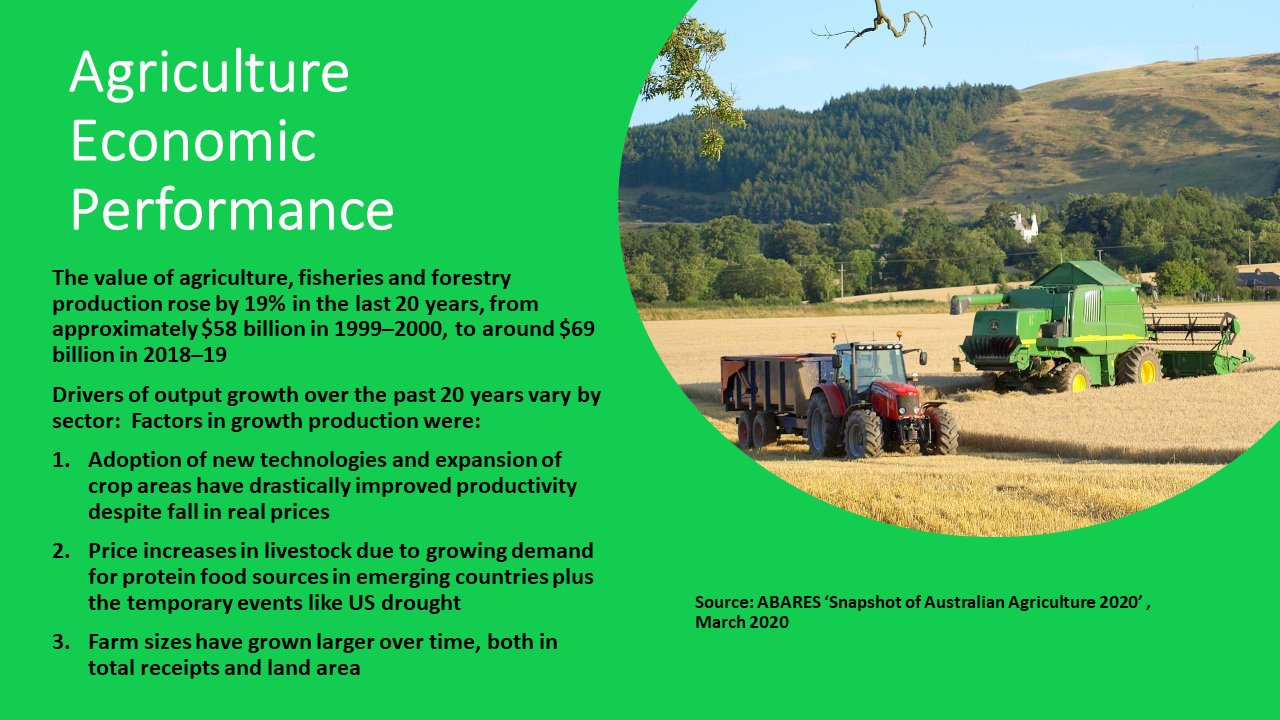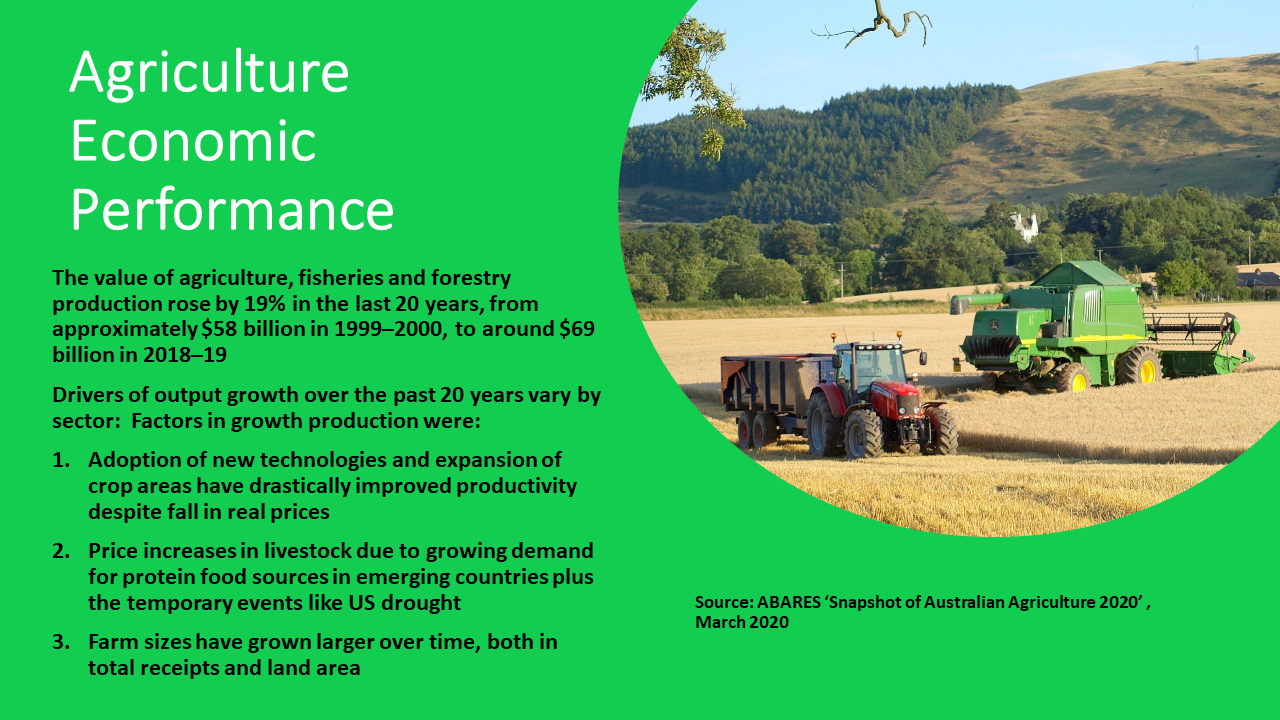Australian Agriculture Industry Staying Strong in the Face of COVID-19

Australian Agriculture Industry Staying Strong in the Face of COVID-19
There is no doubt on the immense impact of COVID-19 in the country. Businesses closing and people losing jobs seems to be happening everywhere.
Food security is a top priority and you can count on the agriculture and farming industry to put food on everyone’s table.
Food Security
ABARES (Australian Bureau of Agricultural and Resource Economics and Scences) reported that Australia ranks among the most secure nations in the world, placing the 12th spot in the world for per capita income. This enables Australians to have access to basic nutrition.

Our country has steady access to diverse and high-quality food, any season of the year without being burdened with changes in world prices.
Australia produces significantly more than we consume (our food exports were worth more than 48 billion dollars in 2018-19). The majority of food is produced domestically, and local production meets more than our needs even during the drought period.
It is unlikely (but still possible) that COVID-19 could disrupt these supply chains temporarily. However, it would not threaten the food security of most Australians.
Australian agricultural producers depend on global supply chains and imported inputs. Shortages or disruptions to these inputs could affect productivity and profitability, so the government and business must monitor and manage emerging risks.
Stimulus Package
As per Agriculture Minister Littleproud’s announcement last March, the federal government released the second stimulus package amounting to $66.1 billion to support agriculture, fisheries, and forestry sectors, combining total amount of federal support to $189 billion. The package includes wage and rental relief for businesses and cash for affected workers.
Eligible SMEs will receive up to $100,000 cash assistance to continue their operation as they recover from drought, bushfires and COVID-19.
Agriculture Exempted from Shutdown
Agriculture Minister David Littleproud announced Australia’s agriculture, food production and supply chain will not be impacted by COVID-19 shutdowns to ensure food production and access:
-
feed, hay, fertilizer and other agriculture products
-
veterinary and animal health/welfare services
-
trucks and freight services carrying food and produce
-
skilled labour critical to agricultural or primary industries
Labour Practices
Employers are mandated to provide safe accommodation for their employees and create an arrangement to ensure human health and social distancing requirements are met.
All visa holders are required to self-isolate for 14 days before working in a different region. Government is collaborating with states and territories on implementation and sanctions supporting the workers’ self-isolation.
Season Worker Programme and Pacific Labour Scheme
Workers under Season Worker Programme and Pacific Labour Scheme visa programs can extend their stay in Australia for up to 12 months to work for approved employers. Approved employers need to engage with labour market testing to guarantee prioritization of local hiring.
Working Holiday Makers Scheme
Working Holiday Makers Scheme visa holders employed in agriculture and food processing will be exempted from the 6-month work limitation with one employer. If their current visa is set to expire within the next 6 months, they are eligible for a further visa to continue working in the agriculture sector.
Agriculture Subsectors
-
Banana – 60% of workers are made up of backpackers or Seasonal Worker Programme visa holders.
-
Citrus – access to migrant workers is crucial during the current harvest season
-
Horticulture - COVID-19 restrictions and risks of shutdown in the event of infection are challenges for horticulture companies that rely on itinerant and seasonal labour,
-
Grains – generally positive outlook with a projected price increase of up to $80/tonne
-
Wool – stockpiling on wool and avoiding auction sales as producers face price and demand challenges
-
Livestock – the Australian Government has launched the International Freight Assistance Mechanism to resolve challenges major disruptions involved in red meat supply and logistics.
Region-Specific Initiatives
WA
Jobs in WA Food and Ag website was launched to help connect regional employers with casual skilled and unskilled workers.
The temporary job site aims to fill labour shortages in the agri industry. WA residents can register their interest to look for jobs in the food, beverage and aquaculture and agriculture industries. It has an online searchable employment record for skilled workers under 30 years old and resources for industry-based career programs.
QLD
Mayor of Queensland's Central Highlands Region Kerry Hayes said there has always been an inherent need for migrant workers in the area's agriculture businesses. It is currently facing a workforce shortage due to COVID-19 travel restrictions. Five months of citrus picking has just begun, hence the demand for agriculture workers.
NSW
New South Wales Premier Gladys Berejiklian announced $140 million extra aid for the primary industry and agriculture sector as the government seeks to keep the state's economy running during the coronavirus pandemic. The aid also covers industries involved in the supply chains – distribution networks, freight, and logistics.
TAS
A $420 million stimulus package was prepared by the Tasmanian Government in tackling the impact of the COVID-19 pandemic.
VIC
The Victorian Government released a $50 million Agriculture Workforce Plan to supports Victorians, including people who lost their jobs due to COVID-19.
The Plan helps individuals find jobs while also helping to ensure the state’s agriculture sector has the labour to continue operations.
SA
The Marshall Liberal Government will provide fee relief to the commercial seafood and charter boat sectors.
Resources
The National Farmer’s Federation released a
guide that outlines basic advice on managing the impact on farming workplaces, including relevant work health and safety and industrial relations considerations.
Safe Work Australia has released
guidelines for agricultural industries to minimise the risk from COVID-19.
Are you struggling to find the right candidate? Let us know. Register your vacancy and we'll help you hire the right person for your business.